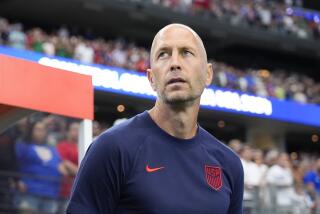Danish Scene Suits Barrett
- Share via
Having spent five years in Major League Soccer and having won an MLS championship with the San Jose Earthquakes in 2001, Wade Barrett last year decided he needed a change of scenery, a broader horizon.
So, like many Americans before him, he headed for Europe, eventually signing with AGF Arhus in Denmark.
AGF is not a fashionable club, even by Danish standards. Located on the coast of Jutland, Arhus is Denmark’s second-largest city, but its soccer team lives in the across-the-water shadow of Copenhagen giants Brondby and FC Copenhagen, the country’s two most successful clubs.
But AGF wanted Barrett and the 27-year-old from Virginia Beach, Va., was happy to make the move.
“To be honest, the club kind of chose me,” Barrett said last week at the Home Depot Center in Carson, where he was training with the U.S. national team for today’s match against -- oddly enough -- Denmark.
“I was just interested in going overseas. I’d been thinking about trying to go and play somewhere. It wasn’t necessarily Denmark, but that just happened to be where the interest came from.
“It was a bit of a gamble. I was happy in San Jose. I liked the guys on the team, I liked the coach, I liked the city, I liked everything about it, but I was just ready to try something different. It’s been a fantastic experience so far.”
Poul Hansen was AGF’s coach when Barrett signed a 2 1/2-year contract one year ago this week.
“It gives our game another dimension to have a strong, fast, left-footed player as left back,” Hansen said at the time.
Which is precisely why U.S. Coach Bruce Arena called Barrett into camp for today’s match. The outside back positions, and the left back spot in particular, are problem areas for Arena.
With World Cup 2006 qualifying starting in June and becoming competitively serious in 2005, Arena has to find a player who can fill that role naturally, comfortably and capably.
At the 2002 World Cup in Japan and South Korea, former UCLA standout Frankie Hejduk was more or less an emergency solution, a right-footed player playing out of position on the left and relying on his athletic ability to get him out of trouble.
It worked then, but Hejduk will be almost 32 by the next World Cup. Arena therefore needs to find a true left back for Germany 2006 and Barrett is one of several candidates.
“It’s good to have Wade in camp, to follow his progress and see how he’s developed since he left MLS,” Arena said. “Wade’s future with the national team is going to be highly dependent on how he fares with his club team, so we’ll be watching him closely over the next year. Right now I don’t think he’s ready to play for us, but hopefully he’ll put himself in contention over the next year.
“Certainly there are a number of players that we’re looking at for the left back spot. It could be anyone from Carlos Bocanegra, Bobby Convey, Eddie Lewis, Greg Vanney, Wade Barrett, Ritchie Kotschau....
“It’s still a question mark. We had a big turnover of players in the last [World Cup] cycle and in that position it’ll be interesting to see what’s going to happen.”
Barrett, a former U.S. under-20 national team player from William & Mary, has played only once for the full national team -- against El Salvador in 2002 -- but he says he knows what Arena seeks.
“Bruce is very clear about what he is looking for,” Barrett said. “He’s looking for top-quality defending No. 1. When you’re one of the back four, you have to be able to defend well, win balls, break up plays, be hard to play against.”
Is the Danish league the place to best hone those skills?
“I think I’ve become even more of a professional since I’ve been there,” Barrett said. “I hope that my play has improved.
“It’s comparable [to MLS]. Sometimes it’s better and sometimes it’s worse. MLS is a good league and I think the Danish league is good, but people don’t know much about it. There are good players and good teams there.”
Meanwhile, Barrett is trying to make the best of each opportunity whenever he is called into camp and using the U.S. team’s run to the 2002 World Cup quarterfinals as inspiration.
“I was amazed with the games and impressed at how the U.S. played,” he said. “In the back of your mind you think maybe you’ll have a chance to do that at some point. That’s the inspiration everybody gets from watching that World Cup. All of us here now want to be part of something like that.”
More to Read
Go beyond the scoreboard
Get the latest on L.A.'s teams in the daily Sports Report newsletter.
You may occasionally receive promotional content from the Los Angeles Times.






